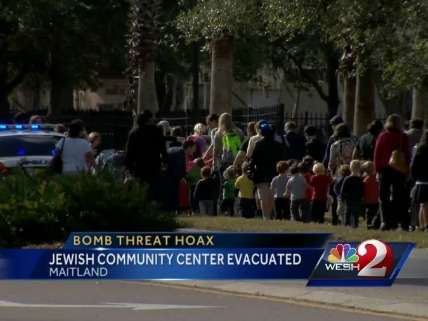Do a Jewish Teenager's Bomb Threats Against Jews Count As Hate Crimes?
An Israeli Jew is accused of making frightening phone calls that were attributed to a post-Trump rise in anti-Semitism.

Today Israeli police revealed the arrest of a Jewish teenager in connection with bogus bomb threats that have rattled Jewish communities across the United States in recent months. The unnamed 18-year-old, who was identified with help from the FBI, is a dual citizen of Israel and the United States who lives in the Ashkelon area. "Investigating hate crimes is a top priority for the FBI," a bureau spokeswoman said, "and we will continue to work to make sure all races and religions feel safe in their communities and in their places of worship."
If the reference to "hate crimes" strikes you as strange in the context of a Jew's threats against fellow Jews, that is probably because you are under the impression that hate crimes are defined by hate. Not so. Under federal law, a person who injures or attempts to injure someone "because of" the victim's "actual or perceived race, color, religion, or national origin" is guilty of a hate crime, regardless of his motive. The definition even includes people who assault coreligionists based on doctrinal disagreements, as in the case of the Amish beard cutters.
The motives of the Israeli-American bomb threat suspect, whom police blame for dozens of frightening phone calls received by JCCs and other Jewish institutions in the U.S., Australia, and New Zealand, remain mysterious. Maybe he is a chaos-loving prankster. Maybe he is a self-hating Jew. Maybe he is a Trump-hating Jew, deliberately reinforcing the claim that the president's election has encouraged a rise in anti-Semitic speech and acts. As far has the federal hate crime statute goes, it does not matter, although the last possibility would lend credibility to Trump's widely derided suggestion that the aim of the bomb threats might be "to make people…look bad."
Then again, since there were no actual bombs, the phone calls may not qualify as attempts to cause "bodily injury," which "does not include solely emotional or psychological harm to the victim." Other federal laws, such as 18 USC 875 (threatening interstate communications) and 18 USC 2333b (terrorist threats), would seem to be a closer fit. In any case, this guy (assuming he is guilty) should be punished for the actual wrongs he did to others, as opposed to his religion-based target selection.
It's not clear whether the suspect will be extradited. Although the effects of his alleged crimes were felt mainly in the United States, the communications were initiated in Israel. Ha'aretz reports that "police are accusing the suspect of extortion through threats and of false reporting sowing panic." The newspaper says "investigators are attempting to determine if he actually received money in connection with any of the threats attributed to him."
According to the Israeli police, "The investigation began in several countries simultaneously after dozens of threatening calls were received at public places, events, synagogues and community buildings that caused panic and disrupted events and activities in various organizations." The police says the suspect used "advanced camouflage technologies" to disguise the source of his calls, which he made over the internet using voice-distorting software and other people's WiFi connections.
Ha'aretz quotes one of the calls: "It's a C-4 bomb with a lot of shrapnel, surrounded by a bag….In a short time, a large number of Jews are going to be slaughtered. Their heads are going to [sic] blown off from the shrapnel. There's a lot of shrapnel. There's going to be a bloodbath that's going to take place in a short time. I think I told you enough. I must go."
Addendum: The teenager's lawyer says he has had a brain tumor since the age of 14, which may have affected his behavior. But according to the Times, Jonathan Greenblatt, chief executive of the Anti-Defamation League, thinks "the threats attributed to the Israeli teenager…should still be considered acts of anti-Semitism," even if the perpetrator is not anti-Semitic. "The motive may have been unclear, but the impact was crystal clear," Greenblatt told the Times. "These were acts that terrorized a community just because of their faith."
[Although Ha'aretz says the suspect is 19, the other reports say 18, so I have changed his age.]


Show Comments (31)